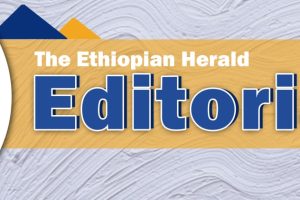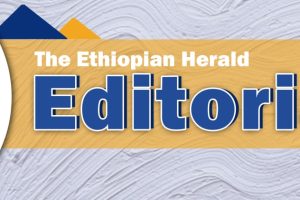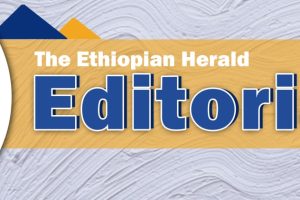
The Foreign ministers of Ethiopia, the Sudan and Egypt met with US President Donald Trump, Secretary of Treasury and the president of the World Bank in Washington, DC on November 6, 2019.
The ministers reaffirmed their joint commitment to reach a comprehensive, cooperative, adoptive, sustainable and mutually beneficial agreement on the Great Ethiopian Renaissance Dam (GERD).
The GERD is a flagship project fully financed by Ethiopians of all walks of life. However, the benefits of the dam go far beyond Ethiopia. Therefore, if there was justice in the world, both Egypt and the Sudan would contribute their fair share as the completion of the dam arrests floods, siltation and increases the annual flow of the water.
For Ethiopia, the Nile is a matter of life. The Nile covers 70 per cent of its water resources, has 30,000 megawatt hydroelectric potential and is used for irrigation, with more than 45 million people directly living in the Basin. The number of people in regions that the Nile traverses is more than 100 million. This shows that utilising the Nile for Ethiopia is indispensable.
While it is Ethiopia’s right and obligation to take care of its rapidly growing population, it is doing it in a civilised way. The project implementation from the outset has been open, transparent and participatory.
Thanks to our founding fathers as independent and liberated Africa, the agreements [Egypt’s agreements on exclusive use of the Nile waters] were declared null and void in the early days of the 1960s. The Nyerere doctrine which was first declared by Julius Nyerere, later followed by Kenya’s Jomo Kenyatta and Uganda’s Milton Obote, nullified those colonial “treaties”. And in 1959, Egypt entered into an agreement with Sudan, dividing the entire flow of the Nile without involving upstream countries and leaving no drop of water for them. This is an insult to the national pride of these African countries.
The Nile Basin countries codified their legitimate and natural right differently from colonials or independent Egypt – through negotiation. All the Nile Basin countries, including Egypt, negotiated for the Cooperative Framework Agreement of the Nile – 1997 to 2010. Now this agreement is the only multilateral and basin-wide negotiated agreement and the only solution to the Nile problem. The agreement was signed by six countries; Kenya, Rwanda, Uganda, Ethiopia, Tanzania and Burundi. Four – Ethiopia, Tanzania, Rwanda and Uganda – have ratified it.
The Grand Ethiopian Renaissance Dam is the key not only to the country’s economic renaissance but also regional integration in Eastern and Northern Africa. Located about 15 km from the Ethiopia-Sudan border, the people of Ethiopia, the Sudan, and Egypt await the electricity that will be generated. This is the shared vision to address common challenges that brings the three governments to the discussion table to maximise the gains and minimise risks of the largest dam ever built on the African soil.
Ethiopia, cognisant of this shared vision and common challenge, invited the governments of Sudan and Egypt to form an international panel of experts to review the design documents of the GERD, provide transparent information sharing and solicit understanding of the benefits and impacts, if any, of the dam on the downstream countries so that trust and confidence is built among all the parties. Though the establishment of such a panel is not common elsewhere in the world, for Ethiopia, whose foreign policy orientation is heavily guided by the principles of cooperation and Pan-Africanism, inviting the governments of Sudan and Egypt to deliberate on a regional project comes naturally.
Also, a tripartite technical committee, composed of experts from Ethiopia, Sudan and Egypt, was all set to implement the recommendations. While the tripartite technical committee was conducting its business, a need for a political declaration emerged. Ethiopia embraced the need and the declaration on the dam was signed in March 2015 in Sudan.
The declaration recognised the international principles of equitable utilisation, no significant harm, and sovereignty over the use of natural resources. It also bestows the Heads of States and Governments as the last resort to settle any dispute that comes along during the implementation of recommendations by the international panel of experts. In pursuit of an agreement that reflects the needs and aspirations of the three countries, an independent scientific tripartite technical committee has been established.
When it comes to cooperation and good neighbourliness, Ethiopia will always be at the forefront.
Ethiopia still awaits the recommendations of the tripartite technical committee as well as the independent technical committee, guided by mechanisms set by the governments of the three countries for the benefit of their peoples.
The construction of the GERD will deepen the traditional ties people in the riparian countries enjoy, ties that have existed since time immemorial. Meles Alem is FDRE’s ambassador to Kenya. He wrote this piece in response to Saturday Nation article: “Lasting peace in Horn depends on solution to Nile conundrum.” It was abridged only for space reason. For full article: https://www.nation.co.ke/
The Ethiopian Herald November19, 2019
By MELES ALEM



